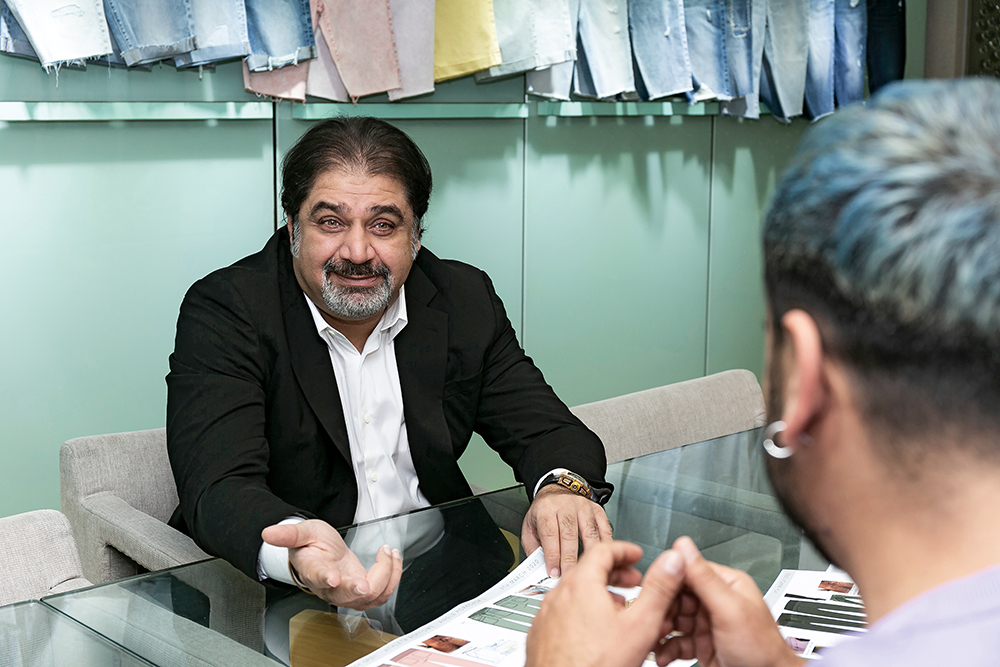“Be honest, work hard and never give up.”: Sanjeev Mahtani
Must Garment Corp is reaping the rewards of investing in sustainability and innovation, yet Owner and Chairman Sanjeev Mahtani puts his success down to hard work and a focus on quality and integrity.
With bases mainly in Bangladesh and Jordan, apparel manufacturing company Must Garment Corp has more than 20,000 workers and ships some 60 million pieces each year, mostly to the United States.

"We’re doing business with almost all the leading retailers in the industry," Owner and Chairman Sanjeev Mahtani boasts. Although its clients include top brands around the world, including JCPenney, Macy’s and Amazon, what might be even more impressive is the company’s use of sustainable fibres.
"In the last year alone, we made around 19 million yards [17.4 million metres] of BCI cotton, and 11 million yards [10.1 million metres] of Repreve Polyester," Sanjeev says.
"In the first year of using these materials, we took it so seriously that we had almost 13 million yards [11.9 million metres] of fabric made from sustainable fibres."
Sanjeev puts sustainability into practice in more areas of the business than textiles. For example, when he first heard that washing a pair of jeans takes 80 litres of water, he was shocked.
"I realised we were wasting so much water and wanted to do something about it," he recollects. The company decided to use technology from eco-efficient textile finishing technology company Jeanologia to reduce water waste by 95%. "There’s a social need and an economic need," Sanjeev says.
"Water and energy prices are both going up in the industrial space, so we would be paying a considerable bill in the future if we didn’t do this now."

When the company set up its flagship warehouse Fashion City 10 years ago, it built a single-storey space rather than multi-level. "It took 29 acres [11.7 hectares] of land to build this factory," Sanjeev recalls.
"People thought I was crazy, but my idea to make it a single-storey building came from what I saw in China; almost all of the factories there had one storey. When you have a single-storey plant, you don’t have to worry about how many goods you’re keeping on each floor. You don’t have to worry about the evacuation of people from different floors of the factory, in case of an emergency."
Sanjeev also decided to air-condition the entire factory. "I believe we have to think ahead of the curve," he explains. "Air-conditioning the whole place, for example, makes it a better environment for our workers. We want to be an employer of choice and have always paid wages above industry standard. Our requirements for efficiency and quality are above standard, so why don’t we pay above standard as well? We also provide a digital means of payment, which is essential.
I’m not interested in cutting corners.
"These practices will go a long way in the future because people really want these facilities. The more facilities that you provide for people, the happier they feel working for you. A stable workforce is a good workforce. If you have a changing workforce, you can never be efficient."
First and foremost, the company is on a mission to become more sustainable. Must Garment has been on a journey towards sustainability for two to three years and has made rapid strides towards this goal. The business’s second focus is on automation.
"We are experimenting with robotics, new software and virtual integration," Sanjeev says. "We have certain components: the machine, the worker and the raw material. We want to integrate these three with the help of software in such a way that we can make much better use of our resources."
The dynamic businessman enjoys the creative aspects of his work so much that sometimes at night he dreams about what he should do for the next season. "I’m a fabric person," he shares.
"I love fabrics and creating new materials. When I develop new textiles and I see people adopt them, I feel intense satisfaction." Sanjeev believes that when there are areas in the business where you can cut corners, honesty is the best policy.
"Every time there’s even a notion of an employee of ours suggesting an idea that would cut a corner, the first thing I say to them is, ‘Look, if I wanted to be a criminal, I would be smuggling gold or drugs. I have a legitimate business and I’m not looking for any shortcuts.’ I believe in building it brick by brick, taking my time to make sure that each brick is stable before I go on to the next brick. I’m not interested in cutting corners."
Throughout his 39 years in the industry, Sanjeev has maintained one simple principle. "If we’ve made a mistake, we will accept it and pay for it," he says.
"Acknowledge the mistake and don’t make it again, but don’t cut a corner and try to evade the subject of the mistake. It will only result in more problems. Be honest, work hard and never give up."
Although there are constant challenges in the fabric manufacturing business, Sanjeev reveals COVID-19 is the biggest obstacle he’s come across. "It’s a disruption of enormous proportions," he admits. "Managing your surroundings is imperative; being forewarned about what is happening in your surroundings is imperative."
What’s more, the retail industry itself isn’t stable. Customer demands can be difficult. "The customer at times may ask to delay shipments or prepone shipments, sometimes it’s about holding goods for as long as a year, or they want to pay for the goods later," Sanjeev explains.
"Sometimes they even cancel the goods for no reason. These are things that become increasingly hard to manage." The challenges don’t frighten Sanjeev though and Must Garment is a very hands-on, detail-oriented business.
"You can’t lose a grip on the situation at any time," he says. "It’s mentally challenging. But if you don’t see the mental challenge as stimulation and don’t enjoy it, it’s not for you."